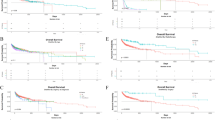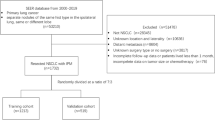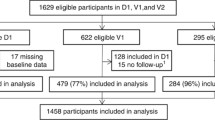Abstract
The usefulness of the Palliative Prognostic Index (PPI) has been successfully validated in a variety of clinical settings. However, while lung cancer is the leading cause of death worldwide, patients with lung cancer accounted for only 6.9–25.8 % of the study populations in these previous studies. We conducted a retrospective study to evaluate the usefulness of the PPI for survival prediction in patients with lung cancer. Patients with lung cancer who were admitted to our hospital between 2009 and 2013 to receive palliative care were enrolled. The association between the Palliative Prognostic Index, determined based on the data recorded in the clinical charts at the last admission to our hospital, and survival was evaluated. The patient group with a PPI of >6 showed a significantly shorter survival time than the patient group with a PPI of ≤6 (P < 0.0001, log-rank test). The sensitivity and specificity of the PPI determined using the cutoff value of 6 for predicting less than 3 weeks of survival were 61.3 and 86.8 %, respectively. However, the sensitivity decreased to 50.0 % when the assessment was carried out in only patients with small cell lung carcinoma. Our findings suggest the existence of a close association between the PPI and survival in patients with lung cancer receiving palliative care. However, the sensitivity of the index for predicting less than 3 weeks of survival was relatively low in patients with small cell lung carcinoma.


Similar content being viewed by others
References
Earle CC, Neville BA, Landrum MB, Ayanian JZ, Block SD, Weeks JC. Trends in the aggressiveness of cancer care near the end of life. J Clin Oncol. 2004;22:315–21.
Maltoni M, Caraceni A, Brunelli C, Broeckaert B, Christakis N, Eychmueller S, Glare P, Nabal M, Viganò A, Larkin P, De Conno F, Hanks G, Kaasa S, Steering Committee of the European Association for Palliative Care. Prognostic factors in advanced cancer patients: evidence-based clinical recommendations—a study by the Steering Committee of the European Association for Palliative Care. J Clin Oncol. 2005;23:6240–8.
Pirovano M1, Maltoni M, Nanni O, Marinari M, Indelli M, Zaninetta G, Petrella V, Barni S, Zecca E, Scarpi E, Labianca R, Amadori D, Luporini G. A new palliative prognostic score: a first step for the staging of terminally ill cancer patients. J Pain Symptom Manag. 1999;17:231–9.
Morita T, Tsunoda J, Inoue S, Chihara S. The Palliative Prognostic Index: a scoring system for survival prediction of terminally ill cancer patients. Support Care Cancer. 1999;7:128–33.
Hyodo I, Morita T, Adachi I, Shima Y, Yoshizawa A, Hiraga K. Development of a predicting tool for survival of terminally ill cancer patients. Jpn J Clin Oncol. 2010;40:442–8.
Anderson F, Downing GM, Hill J. Palliative Performance Scale (PPS): a new tool. J Palliat Care. 1996;12:5–11.
Stone CA, Tiernan E, Dooley BA. Prospective validation of the palliative prognostic index in patients with cancer. J Pain Symptom Manag. 2008;35:617–6122.
Alshemmari S, Ezzat H, Samir Z, Refaat S, Alsirafy SA. The palliative prognostic index for the prediction of survival and in-hospital mortality of patients with advanced cancer in Kuwait. J Palliat Med. 2012;15:200–4.
Sonoda H, Yamaguchi T, Matsumoto M, Hisahara K. Validation of the Palliative Prognostic Index and Palliative Prognostic Score in a palliative care consultation team setting for patients with advanced cancers in an acute care hospital in Japan. Am J Hosp Palliat Care. 2013. doi:10.1177/1049909113506034.
Hamano J, Kizawa Y, Maeno T, Nagaoka H, Shima Y, Maeno T. Prospective clarification of the utility of the Palliative Prognostic Index for patients with advanced cancer in the home care setting. Am J Hosp Palliat Care. 2013. doi:10.1177/1049909113504982.
Ferlay J, Shin HR, Bray F, Forman D, Mathers C, Parkin DM. Estimates of worldwide burden of cancer in 2008: GLOBOCAN 2008. Int J Cancer. 2010;127:2893–917.
Elias AD. Small cell lung cancer state-of-the-art therapy in 1996. Chest. 1997;112:251S–8S.
Arai Y, Okajima Y, Kotani K, Tamba K. Prognostication based on the change in the palliative prognostic index for patients with terminal cancer. J Pain Symptom Manag. 2014;47:742–7.
Conflict of interest
None.
Author information
Authors and Affiliations
Corresponding author
Rights and permissions
About this article
Cite this article
Inomata, M., Hayashi, R., Tokui, K. et al. Usefulness of the Palliative Prognostic Index in patients with lung cancer. Med Oncol 31, 154 (2014). https://doi.org/10.1007/s12032-014-0154-x
Received:
Accepted:
Published:
DOI: https://doi.org/10.1007/s12032-014-0154-x




